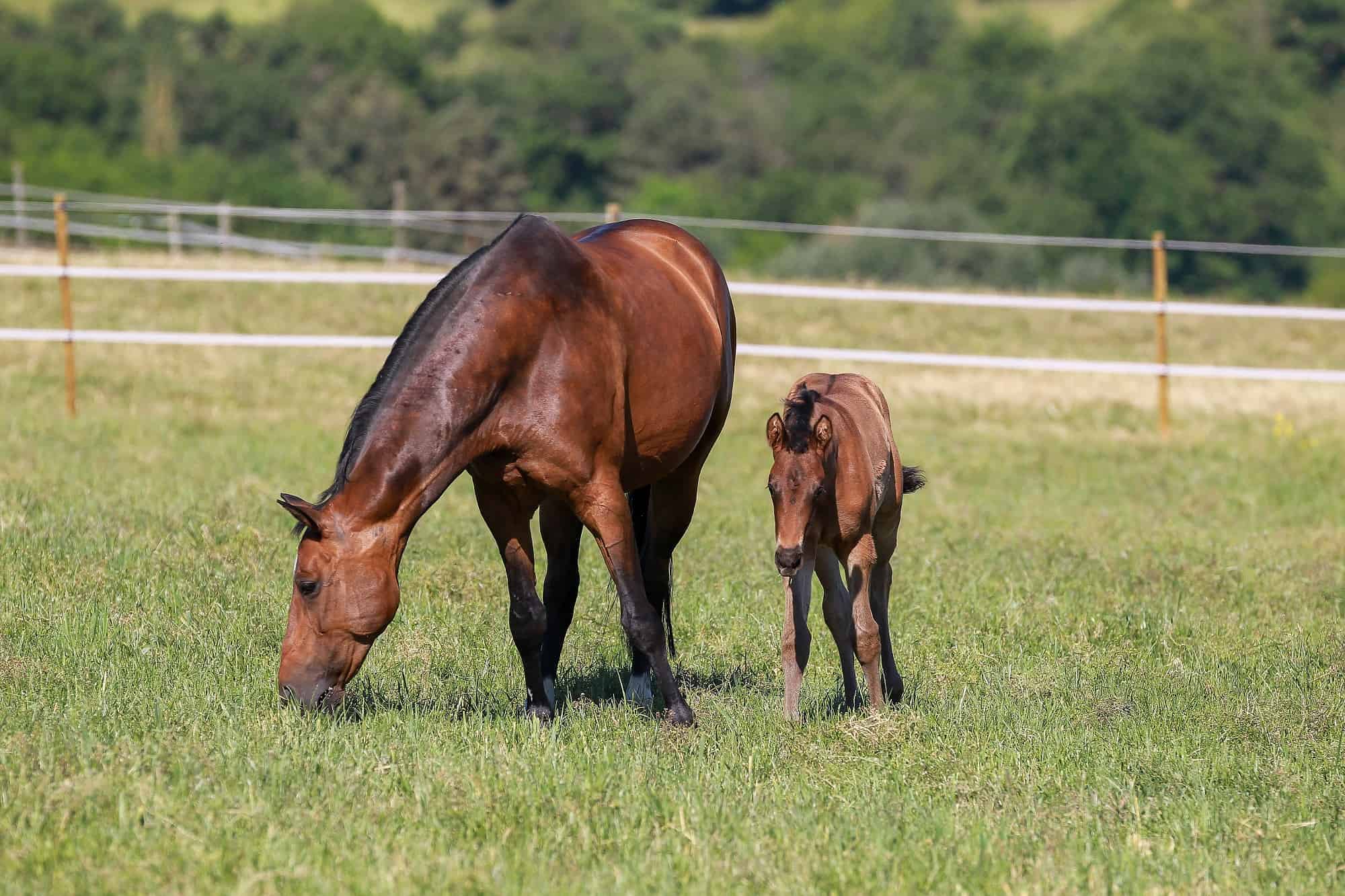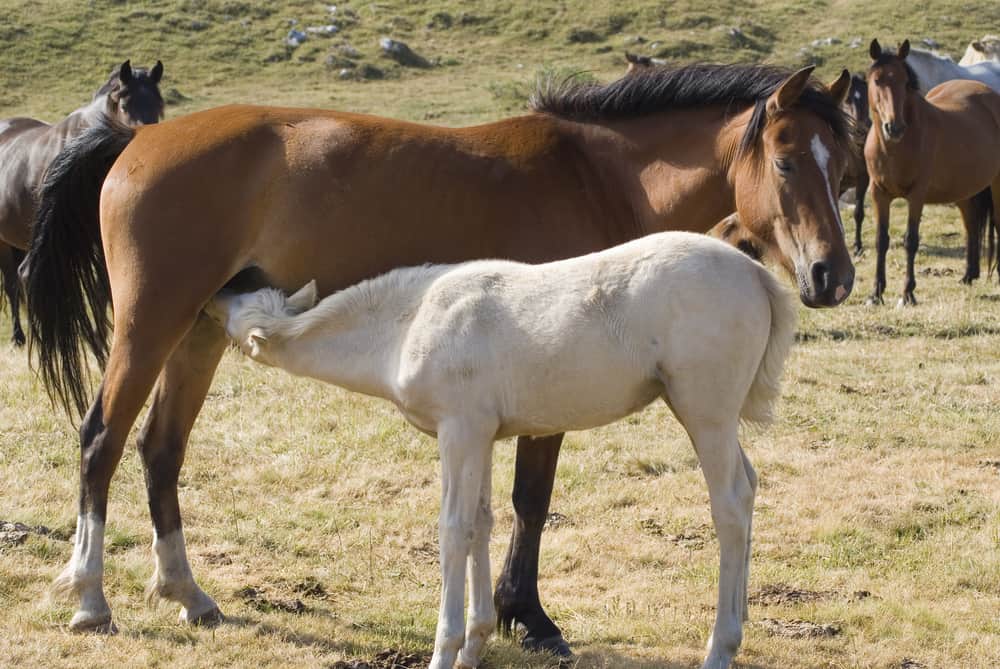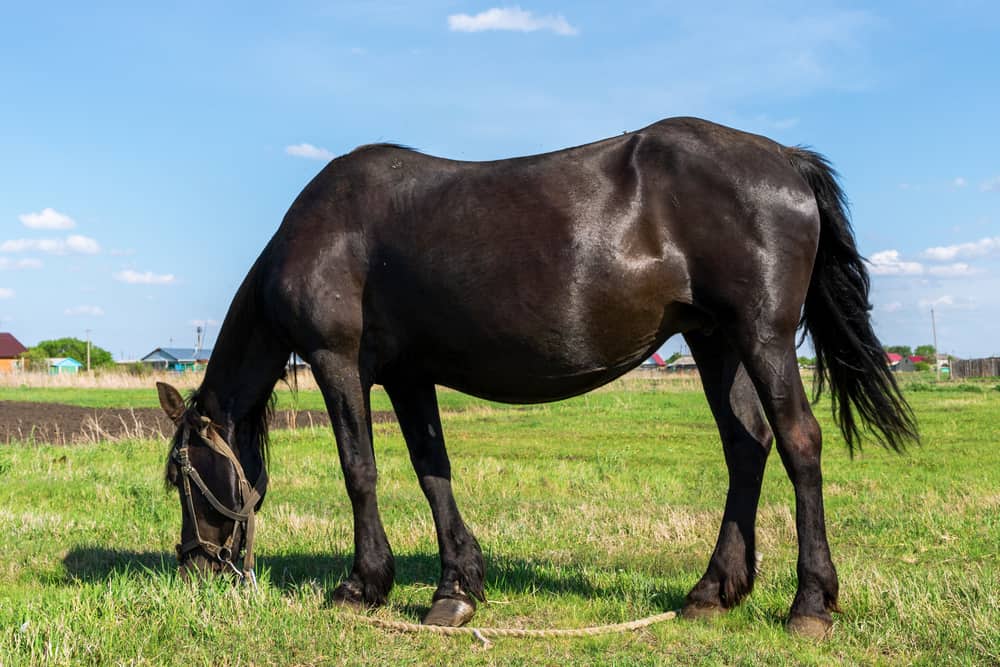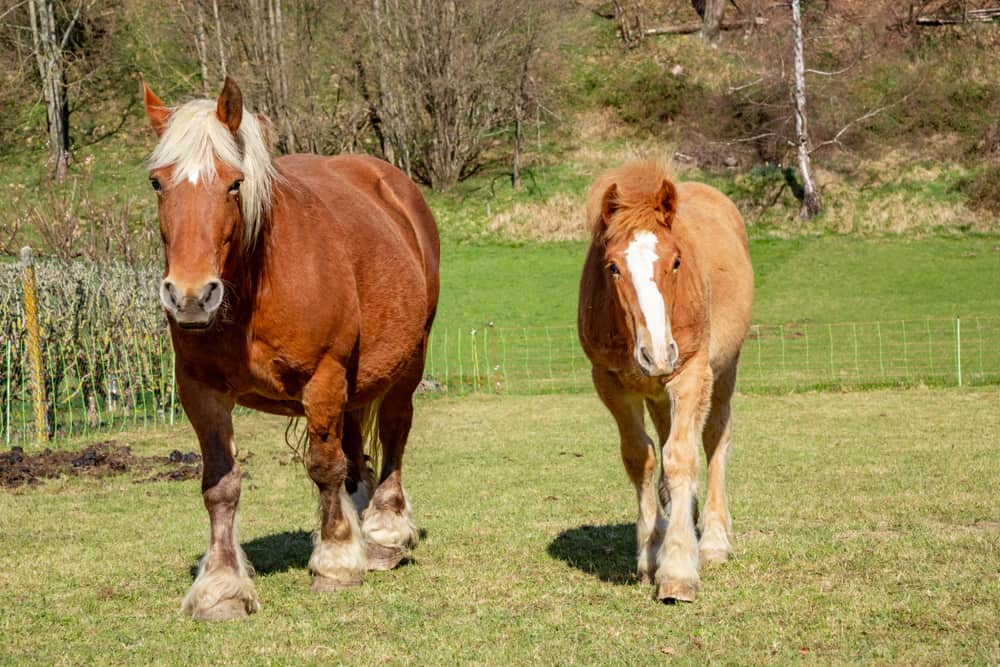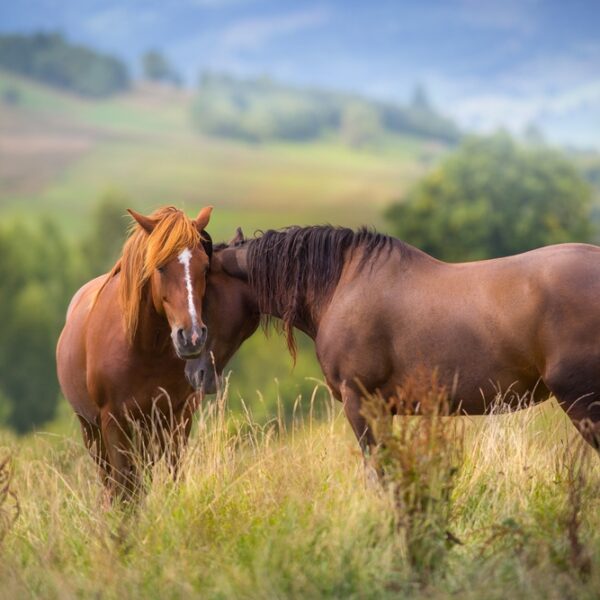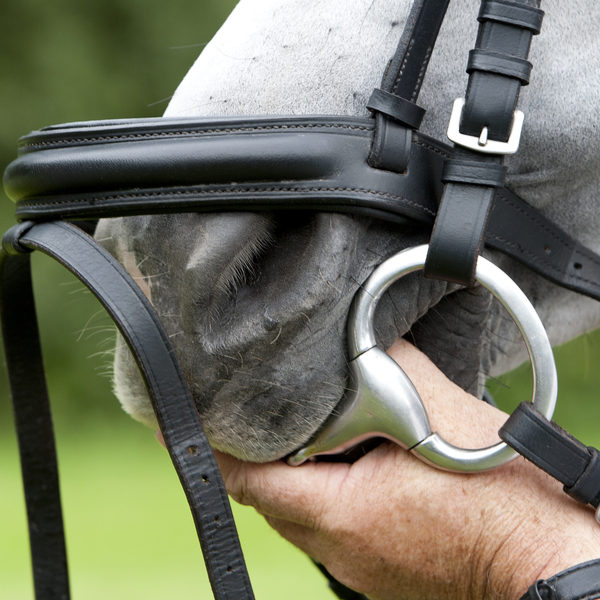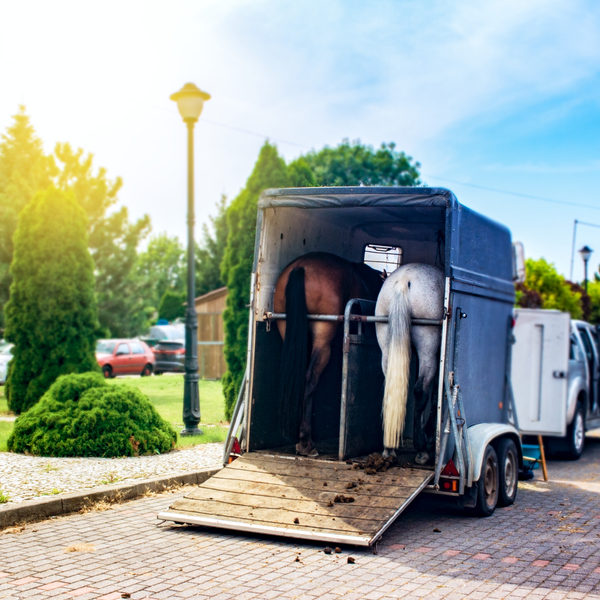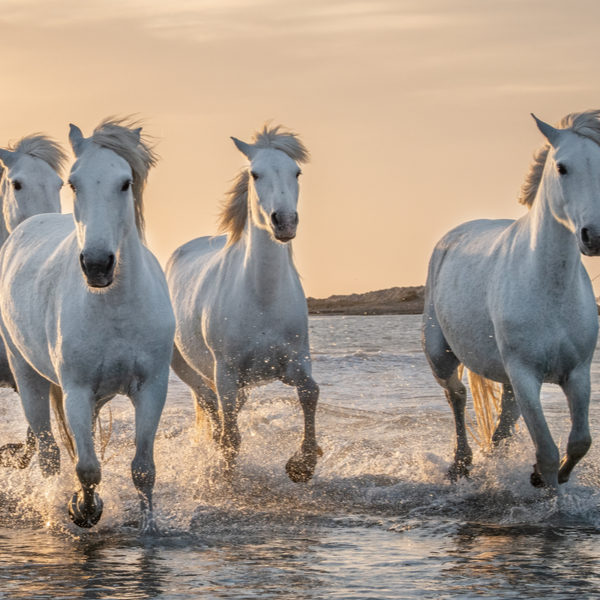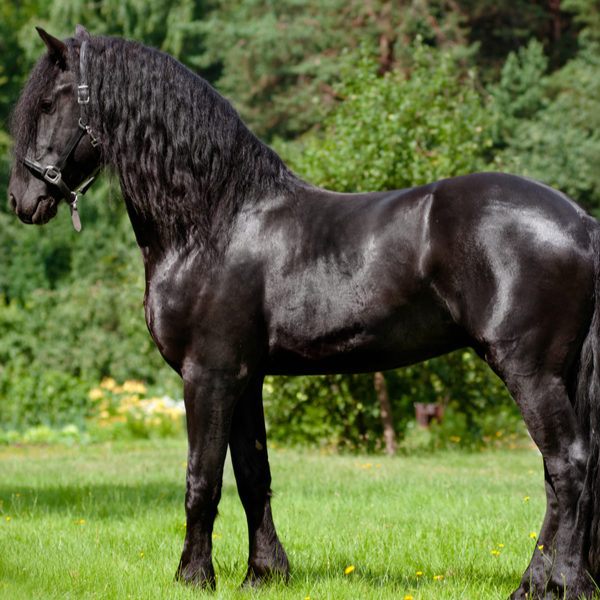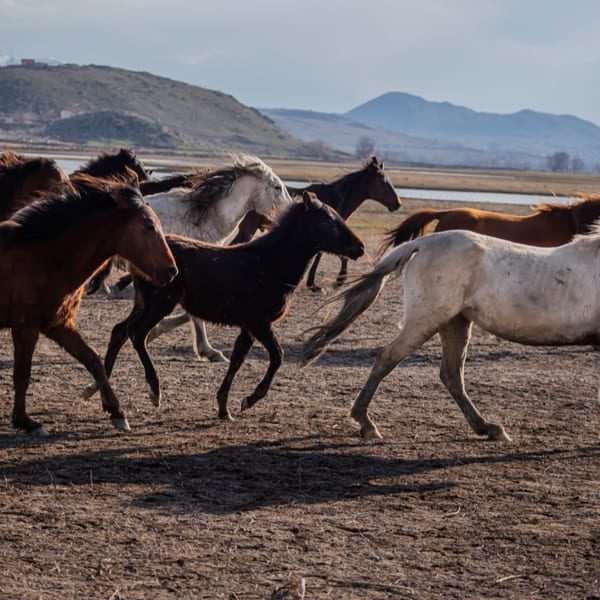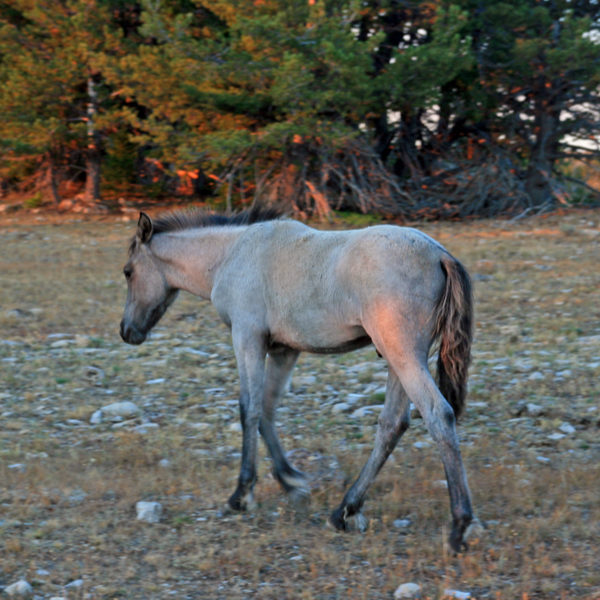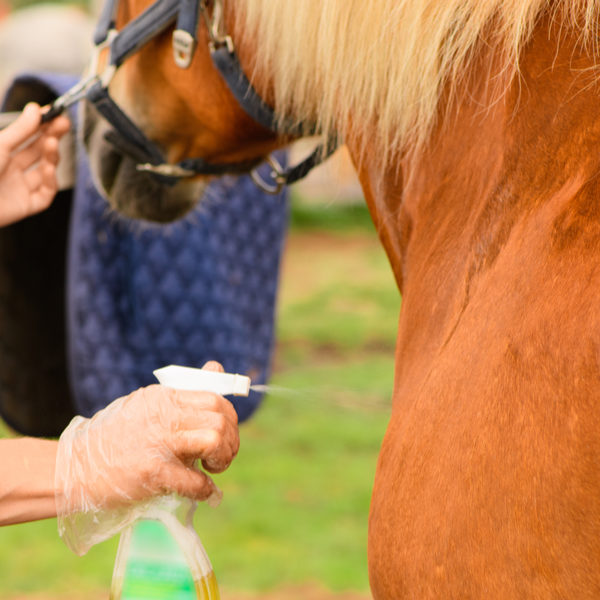Horse breeding is a big business, and one that can be very rewarding too. If you’re considering breeding from your mare, you need to know what to expect.
One of the most basic questions is, “What is the gestation period for a horse?” We’re going to take a look at the answer, as well as some other interesting facts about equine reproduction.
So step this way to find out more about successful horse breeding.
When do horses mate?
Mares are receptive to stallions at regular periods throughout the spring and summer. Those periods are known as when they are “in heat” or, to give it its formal name, “estrus”.
The precise cycle will vary between animals, but is usually about three weeks long. A mare is usually in heat for about 6 days, but that can range between 4 and 10 days. And the first estrous cycles in the spring can see mares in heat for much longer than this.
Horses living wild will usually mate during the summer, with foals born the following spring. Breeders, particularly those breeding Thoroughbred racehorses, will sometimes aim to bring this timetable forward.
To do this, they will expose the mare to artificial lighting. This fools the animal’s brain into thinking the longer days of summer have arrived. This in turn stimulates the production of reproductive hormones.
How long is the gestation period?
We’ve already seen that horses usually mate in summer, with foals born the following spring. But the precise length of gestation varies significantly.
In this, horses are different from many other mammals. Sows, for example, will reliably give birth between 114 and 118 days after conception.
With horses, the range is much longer, and varies according to the animal. Generally speaking, ponies have shorter periods of gestation than horses. For mares that have already foaled, the breeder may have a good idea of their individual gestational period.
That can be anything between 320 and 380 days. The average is considered to be around 330 days, or 11 months.
This inconsistency has been the subject of many studies. One such study examined the average gestational period in a herd of Standardbred horses. During the research period, 594 foals were born, with an average gestation of 349 days.
The sex of the foal also seemed to make a difference to the gestation period. On average, colts had a slightly longer gestation than fillies, at 350 days compared to 348.
How to tell if a mare is pregnant
Horses may not show signs of pregnancy for up to three months after conception. Today, ultrasound makes it easier to find out if a mare is pregnant at a much earlier stage. An initial examination at around day 14 of gestation can check for pregnancy. And a further ultrasound can be used to check the heartbeat of an embryo as early as 26 days into gestation.
Before ultrasound was available, breeders could check the horse’s estrous cycle to determine if breeding had been successful.
Most mares would come into heat again between 17 and 20 days later if they were not pregnant. Signs of estrus include the mare opening and closing the vulva, tucking her hips and raising her tail.
Another sign of pregnancy is a mare whose cervix is tightly closed. This is something a veterinarian can check for with a sterile speculum. And experienced vets will be able to detect a bulge in the mare’s uterus from around day 35 of the pregnancy.
The problem of twins
In almost all cases, if a mare is carrying twins, the pregnancy won’t be successful. The uterus is simply not large enough to sustain two fetuses. If the mare manages to give birth to both foals, they are usually weak and will not survive.
This sadly means that the best approach is to sacrifice one twin. This is usually the smaller of the two, and is done at an early stage in the pregnancy.
A veterinarian should check for twins on day 15 or 16 of gestation. If they are present, the smaller twin will be terminated. The procedure is sometimes known as “pinching off” or, more brutally, as “crushing”.
The veterinarian will carry out a further examination 2 to 3 days after the procedure. This will check to see that the remaining embryo has survived.
Care of pregnant mares
A pregnant horse needs particular care to support her to carry her foal to full term. Horses don’t have a great record at doing this, so everything you can do to help her is important.
Stress can cause a pregnancy to fail, so minimizing this is key. Avoid transporting a pregnant mare, and ensure she is able to exercise every day in a field or paddock. If she’s kept with other animals, make sure that they get on well.
She won’t need a special diet for the first part of her pregnancy. Up until around 7 or 8 months into gestation, her usual diet of grass or hay will be fine. Concentrates can help too, to ensure she’s getting the right balance of vitamins and minerals.
For the last three months of her pregnancy, she should gradually be eating more and more. This is the time when the fetus is growing more rapidly, so it will need more calories. The mother’s weight can increase by between 15 and 20 per cent during this time.
To gain those extra calories, the mother will need a diet of legumes or grass hay, together with concentrates. The latter should be comprised of about 12 to 14 per cent protein.
Other supplements can be valuable too. For example, marine-derived omega-3s, known as E-O3, can help boost the foal’s immune system and improve milk production.
Some things should be removed from the mare’s diet now too. Fescue, a type of grass, can prolong pregnancies, thicken the placenta and reduce the amount of milk the mother produces. For that reason, it should be eliminated from her diet from around 2 to 3 months before her due date.
It’s also important to be careful about what drugs are administered to a pregnant horse. Vaccinations should be avoided in the early stages of gestation, up until about day 90. If possible, it’s best to avoid them altogether until about 30 days before she is expected to give birth.
That means if you’re planning to breed from your mare, you should get her vaccinations done beforehand. The same goes for deworming. Consult your veterinarian for advice.
When do horses give birth?
The majority of horses give birth at night. It’s generally believed that this is a survival mechanism. A night-time birth will give the foal time to find its feet so it can run by daylight.
In some studies, however, a significant proportion of mares gave birth at around lunchtime. Indeed, on one commercial farm, 41 percent of mares gave birth during the day. That means regular checks are important during both day and night when the horse is getting ready for labor.
Can labor be induced in horses?
Sometimes owners will ask whether labor can be induced, particularly if they’re worried a pregnancy has gone on too long. Most veterinarians strongly advise against this.
The most common reason for a prolonged pregnancy is that the mare has eaten fescue. By the time this becomes evident, inducing labor won’t help. And it carries a high risk of serious side-effects, and even death, to both the mother and foal.
So unless there’s imminent danger to health of the mare, it’s something that shouldn’t be attempted.
How long is a horse in labor?
Equine labor is a relatively quick process. It can be divided into three stages.
In the first stage, the mare is anxious and may kick at her belly. She may make a “nest” and urinate a lot. Sometimes she’ll sweat. This stage finishes when her waters break – you’ll see a rush of fluid at this point.
The second stage is where the foal appears. This usually takes between 15 and 25 minutes. Unlike in humans, the umbilical cord between the mother and foal isn’t cut immediately after birth.
The third and final stage is where the placenta passes out of the mother’s body. This must happen within three hours of the birth. If it doesn’t, emergency medical intervention will be needed.
So to sum up…
Horses vary considerably in the length of their gestation periods. Their size and own genetics determine how long it takes. So be prepared for anything between 320 and 380 days.
If you’re planning to breed from your mare, ensure she has all her vaccinations and deworming treatments beforehand. And if you have a pregnant horse, it’s important to give her special care. Avoid stress and make sure she has regular exercise.
She’ll need to eat more towards the end of her pregnancy. Composites and other supplements can help ensure she has all the nutrients she needs. And make sure she doesn’t eat fescue in the last 2 to 3 months before her due date.
Your veterinarian will be able to provide good advice on how to give your horse the best possible care. Good luck, and we hope you’re soon welcoming a new addition to your equine family!
